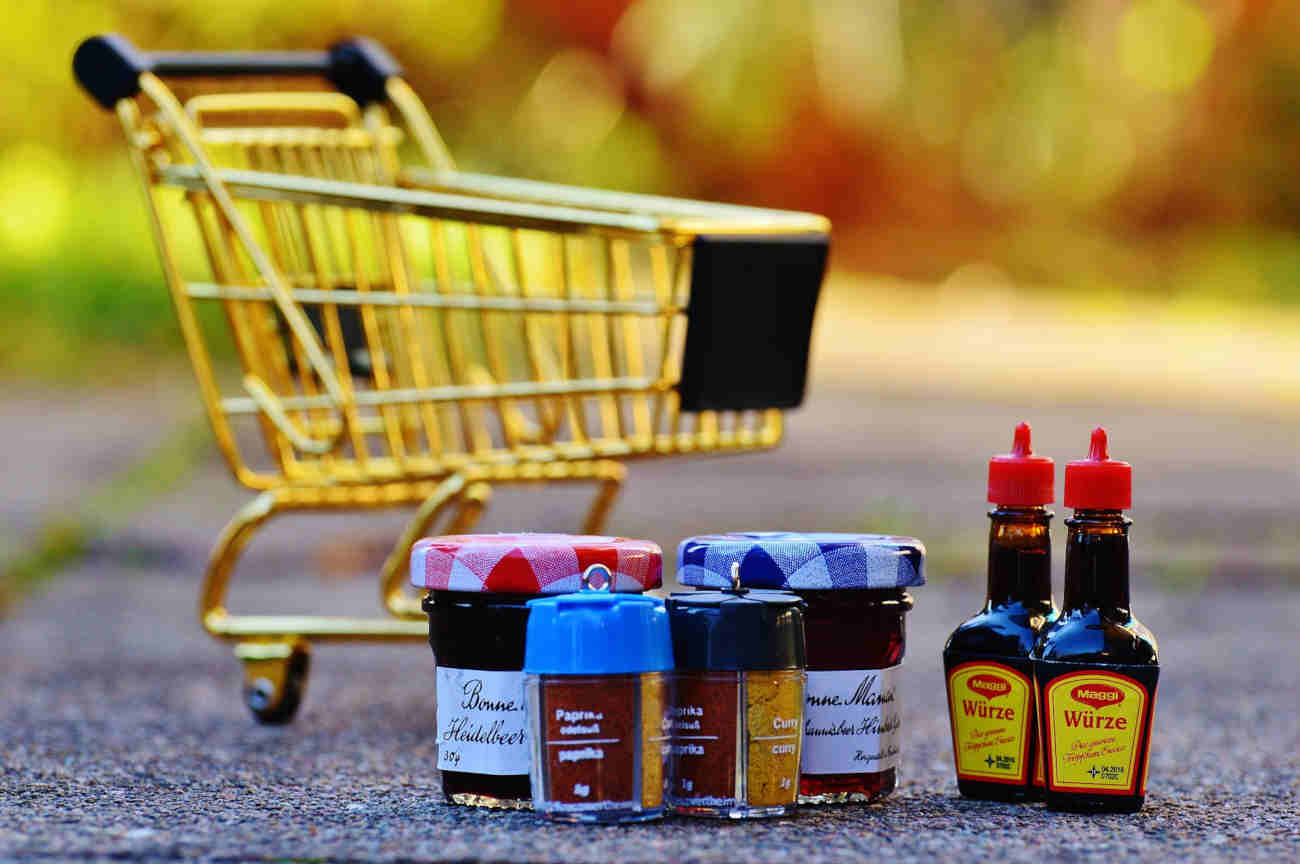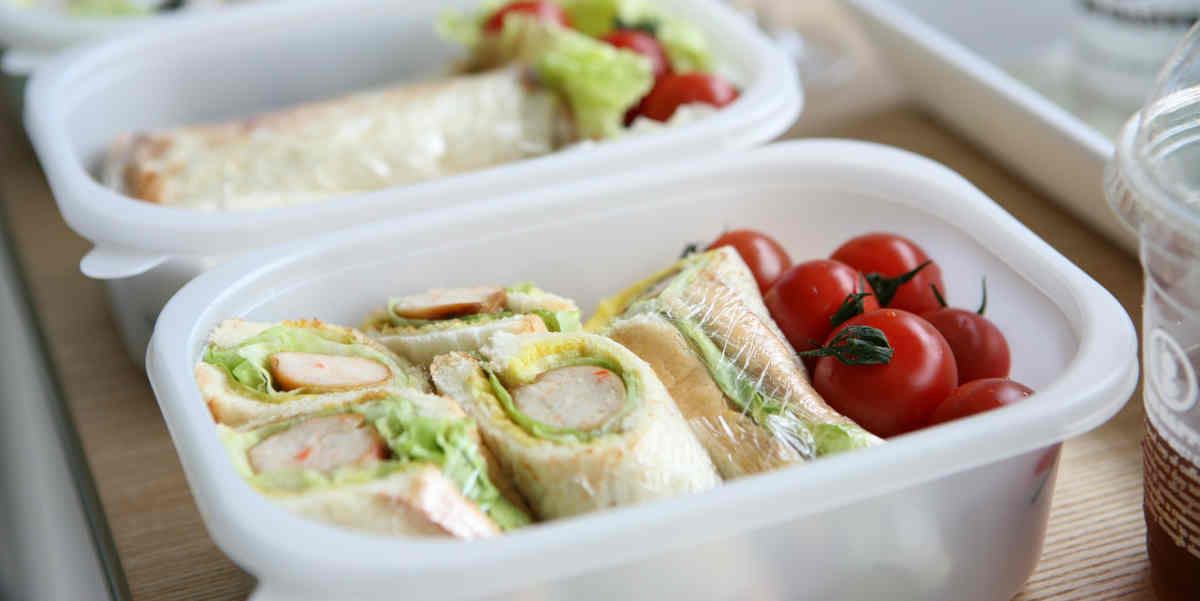When it comes to food, it can be difficult to think with our heads, rather than our stomachs. But whether you’re doing the weekly food shop or eating out with a friend, making a few simple choices could save you more money than you might realise.
In 2017 the average annual food and soft drink spend for a typical household in the UK was £4,365, or £363.75 a month.
Are you concerned about how much you’re spending on food? Do you want to start eating healthier for less? If so, read our ideas for how to keep your stomach happy, whilst looking after the pennies.
1. Never go food shopping when you’re hungry

Before you head to the supermarket, make sure you have something substantial to eat. This way you’ll be less tempted to make indulgent, impulse purchases based purely on hunger. When you’re really hungry, you’re body might try to convince you that you want to eat all kinds of things that aren’t necessarily good for you. So you might find that the supermarket bakery or the confectionary aisle seem particularly attractive when you’ve forgotten to eat your lunch!
These sugary snacks have little nutritional value and won’t fill you up for long, leading you to eat more.
You’ll probably also find that you buy more than you need, and you’re overall spend is greater than usual because you’ve let your stomach make all the decisions. If you want to shop with a clear head, eat first and shop later!
Get expert mortgage advice*
Looking to discuss your mortgage options? Rest Less members can book a free mortgage consultation from Fidelius. Speak with a qualified, FCA-regulated, independent mortgage adviser you can trust. Rated 4.7/5 on VouchedFor from over 1,000 reviews.
2. Make the most of leftovers

If you want to make your food go further, never overlook the magic of leftovers as they’ll save you both time and money. Always put leftover dinner into a tupperware container and save it for lunch or dinner the next day. You’ll appreciate it when you don’t have to buy lunch or spend your evening cooking an entirely new dish.
In most developed countries, over half of all food waste takes place in the home – causing our pockets and our planet to suffer as a result. To demonstrate the environmental impact of our actions, experts predict that if food waste were a country, it would be the third biggest emitter of greenhouse gases after the USA and China.
So next time you’ve got some rice left over from a chili con carne or some turkey slices left over from a roast dinner, steer clear of the bin and try to incorporate these into your meals over the next couple of days. Make leftovers your friend and see how much money you can save – you’ll be pleasantly surprised.
3. Always carry a snack

When your blood sugar levels dip because you’ve let yourself get too hungry, your natural instinct might be to reach for the nearest convenience food, which may not necessarily be the cheapest, or the healthiest.
All those little snacks you buy on your travels can add up over time. Snacks are deceptive because although individually they might seem small and cheap to buy, you might be shocked to find out how much you’re spending on them over the course of a month or a year.
To avoid your snack-based spending habits creeping up on you, always carry a healthy snack with you. The best snacks are things like protein bars, nuts or fruit as they’ll give you the energy boost you need and keep you feeling fuller for longer (or at least until you get home). Make sure you include these in your weekly food shop, as they’ll be cheaper to buy in supermarkets than they will from your local convenience store. To keep to a healthy diet and be the savviest of shoppers, never leave home without a snack.
4. Always find a use for overripe fruit

Take pity on that super spotty banana or that squishy avocado and rather than condemning them to the food waste bin, think about how you can use them in your cooking. Many recipes work best with overripe fruit and veg as it has a better flavour or is easier to mash.
For example, overripe bananas provide a stronger and sweeter banana flavour when used in a banana bread recipe, and soft avocados can be mashed easily and combined with a few simple ingredients such as red onion, garlic and a hint of lemon or lime juice to make a delicious guacamole. You can also blend overripe fruit into tasty, healthy smoothies.
Always think creatively and make food go further where you can – you’ll increase your bank balance and spend less time in the supermarket.
Get your free no-obligation pension consultation
If you’re considering getting professional financial advice, Fidelius is offering Rest Less members a free pension consultation. It’s a chance to have an independent financial advisor give an unbiased assessment of your retirement savings. Fidelius is rated 4.7/5 from over 1,500 reviews on VouchedFor. Capital at risk.
5. Visit pound shops

If you want to stock up your cupboards cheaply, explore your local pound shop. You might be surprised to find that they stock a lot of your favourite grocery products for – you guessed it – only £1! Consider splitting your food shop between supermarkets and pound shops to get the best value for money and avoid buying anything that’s more expensive in the supermarket if you know you can get it for £1.
You’ll be glad you made the extra effort when you start seeing how much you’re saving.
6. Always carry a bottle of water with you
Never underestimate how much you could save by carrying your own bottle of water when you’re out and about. Most places will fill it up for you for free when it’s empty meaning you can still get your recommended 1.2 litres of water a day without spending a penny. Every time you get your bottle filled up, you could be saving an average of £1- £2 per bottle. What’s more, you’ll be significantly helping the planet by cutting down on the amount of single use plastics that we consume and throw away every day.
If you want to keep your thirst at bay without putting a dent in your wallet, consider investing in a Nalgene bottle*. They are virtually indestructible, and at such a reasonable price, the amount it costs will soon be superseded by the amount you save on water by carrying it with you.
7. Sign up to a food sharing app

Food sharing apps are the perfect way to find free food, but also avoid wasting your own.
Apps like Olio allow you to search for food going spare in your local area – all you have to do is contact the person giving it away to arrange to pick it up. You can also list items yourself – it’s also a great way to avoid throwing food away if you’ve bought too much of a particular ingredient or if you’ve still got a fridge full of food but are due to go on holiday.
Think how satisfied you’ll feel when your unwanted food dodges the bin and provides a whole dinner for another family, or when you make a two course dinner out of free ingredients you picked up from your neighbour. Join the food sharing revolution today; you won’t be disappointed.
8. Bring lunch to work

How much do you spend on lunch everyday at work? Do you usually eat whatever’s recommended on the menu in the canteen? Or do you nip across the road to your favourite sushi place? Spending £5 or £6 on lunch everyday might not feel like a lot at the time, but it soon adds up when you consider that you could be spending over £1000 a year – and that’s on top of your weekly household food shop.
If you want to halve your lunch expenses, try preparing your own lunch to take to work. The best way to do this is to plan your dinners for the week ahead, making sure that when you do your weekly shop, you buy enough of each ingredient to allow you to have a portion of dinner leftover each night.
These leftovers can be popped into a tupperware box and taken to work with you the next day. This way you don’t have to do any extra cooking and you don’t have to spend a penny on lunch at work. If you’ve prepared your own healthy lunch, then you’re also less likely to be tempted by unhealthy options, so not only will you save money, but your health will improve too – bonus!
9. Switch to a reusable coffee cup
Many coffee places will charge you extra for the price of your take-away coffee cup, so by carrying your own reusable cup, you could really make a saving. For example, Pret-A-Manger charge 50p extra for coffee served in a disposable cup, meaning that even if you only drink one coffee a day, you’re spending a whopping £180 a year on cups alone.
And if savings alone are not enough to persuade you, it’s estimated that we throw away 2.5 billion coffee cups in the UK every year. 99.75% of which can’t be recycled because of the materials used.
So, if you want to be kinder to your bank balance as well as the environment, why not invest in a reusable cup and feel particularly smug when you drink your morning coffee tomorrow? KeepCup* are a particularly popular brand, but there are increasingly sturdy and stylish collapsible cups like this one from AniSqui* that are easier to tuck in your pocket or Handbag to carry around.
10. Use restaurant voucher codes

11. Swap to cheaper brands

If you’re buying manufacturer’s brands such as Heinz or Walkers, or Premium brands such as Tesco’s Finest or Sainsbury’s Taste the Difference, then the quickest and easiest way to make instant savings is to swap these out for cheaper brands.
Most supermarkets offer two types of their own branding – one that is similar to some of our favourite brands (but slightly cheaper) and another basic, no frills version e.g. Tesco Everyday Value or Asda Smartprice. More often than not, the only difference you will notice between products from each of these different brands is the packaging. Supermarkets and food manufacturers are experts at getting you to buy more expensive brands, as it’s in their interest for you to pay more. One such trick is to place expensive brands on the shelf at eye level, so always scan shelves and read packaging to see if a cheaper alternative may be just as good.
12. Location, location, location…

Instead of going to a coffee shop or cafe to work or read, why not try visiting your local library? Coffee shops and cafes usually expect you to buy something if you want to use their facilities which means that over the course of a morning at your local cafe, you could easily end up spending £10+ on breakfast and coffee. Doing this just a couple of times a week will cost you £80 a month, just to use a space for work, or some much needed quiet time.
13. Go out for lunch instead of dinner

If you’re long overdue for a catch up with a friend and have your heart set on eating out, then why not arrange to meet them for lunch rather than dinner? People typically eat and drink more in the evenings and dinner menus are often a lot more expensive. Lunch is a lighter, cheaper alternative and you’re unlikely to drink much alcohol if you know you’ve still got to get on with the rest of the day.
We all know there is no magic bullet for keeping the finances in good shape, but by making small changes to simple everyday habits you might be surprised at how quickly it all adds up.
Got any other tips? Then please email them to info@restless.co.uk. We’d love to hear from you.

